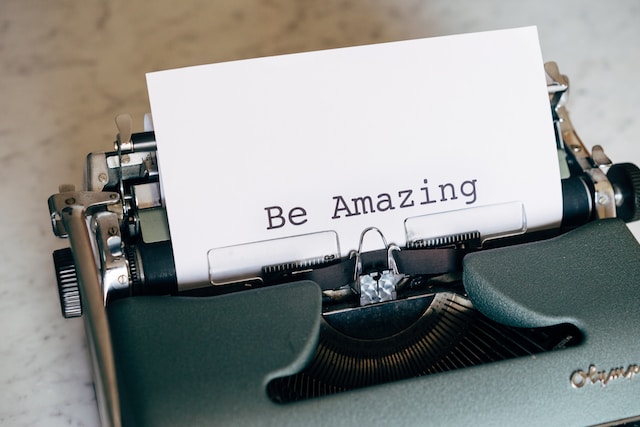Positive affirmations – what do you make of them? In my experience, there tends to be three schools of thought when it comes to positive affirmations – never heard of them, heard of them and think they’re a load of woo, or absolutely obsessed with them. And, yep, you guessed it, I fall into the latter camp. Using affirmations has really helped me change my mindset for the better. I use them every single day and have done for years now, so I thought it was about time that I wrote a blog post all about them!
What Are Positive Affirmations?
So, for those of you who have never heard of positive affirmations, let me help you out. Positive affirmations are basically statements that you can write, read, or say out loud, that help you to overcome negative and limiting thoughts and have a more positive outlook on life. Sounds pretty great, right?
The statements could relate to any area of your life, from parenting to work to exercise, and the really exciting thing is that the more regularly you read or say your affirmations out loud, the more likely you are to change your thought patterns. So, with the use of the right affirmations and a little bit of practice, we’re all capable of reducing our negative thoughts and moments of self-loathing and can start to cultivate a more optimistic, confident, and resilient mindset instead.
Aren’t Positive Affirmations a Load of Crap?
When I tell people that I use positive affirmations to help me with my mindset, the most common response I’m met with is “aren’t they just a load of crap?”. It’s safe to say that when it comes to any chat about positivity or shifting our mindsets, there will always be a group of people out there who are cynical. Human beings are resistant to change, and here in Britain, having a bit of a downer on yourself is accepted as the norm.
I want to make it clear that when I talk about positive affirmations, I’m not talking about making a shopping list for the universe or relying on the law of attraction to sort your life out for you. I’m talking about reprogramming our thinking patterns so that we can have a more positive and optimistic outlook on life. And we all want that, right?
Affirmations have been scientifically proven to work in hundreds of pieces of research – take this study, for example, which showed that spending a few minutes thinking about your strengths before a high-powered meeting (such as a performance review or an interview) can help to calm your nerves, increase your confidence, and improve the likelihood of a successful outcome.
Nobody can promise you that by practicing your positive affirmations you’ll suddenly win the lottery or find your dream husband overnight. But you will become more positive, more confident, and more resilient, and in turn, that will improve your chances of living a happier and more successful life.
Because we can’t control the things that happen to us, but we can control the way that we react to them. And by using positive affirmations, we can get better at focusing on the good stuff, bouncing back from the bad stuff, and having the confidence to go after what you really want in life.
And in my experience, those are all things that we need to do in order to squeeze every last bit of joy out of our time here on planet earth.
How Do I Use Positive Affirmations Then?
If you’re still reading, I’m guessing that you’re probably a little bit intrigued about positive affirmations and willing to give them a go. If that’s the case – I’m so pleased! And I guess I better give you some tips on how to use them, shouldn’t I?
So first of all, let’s talk about which positive affirmations you should use. A quick Google search will throw up hundreds of ideas for affirmations, and I’ve also attached a document with some of my favorite ones to help you get started, but finding the right ones for you will require you to do a bit of thinking about which thought patterns you’d like to change.
A good place to start is by making a list of what you think of as your negative qualities. Or consider that inner monologue we all have running inside our heads – what things are you telling yourself regularly? Are there certain thought patterns or beliefs about yourself that have been holding you back?
If you’d like to write your own affirmations, there are a couple of bits of best practice to use. Firstly, write them in the present tense. So rather than writing “I will get better at being patient,” you would write “I am patient and understanding with everyone in my life.” Secondly, keep them positive! Don’t be half-hearted – aim for the most positive outcome, even if it feels out of reach right now.
Once you’ve got your positive affirmations nailed down, the key is to practice them regularly. How you do that will be different for everyone, but the three key ways to practice your affirmations are to say them aloud, read them, or write them down. We all learn and absorb information in different ways, so think about what type of learner you are and what feels most comfortable for you.
To really get the full effects of positive affirmations, you need to be practicing them daily. This doesn’t have to be a huge chore that you add to your to-do list; it’s more about making it a habit that you can keep up with – so maybe you’ll say them aloud in the shower or read them on the train to work.
Finally, to really get the full value of affirmations, you need to put some feeling into your practice. So rather than just writing out your affirmations like you used to write lines in detention or repeating them aloud in a monotone voice, think about how those words make you feel and what you’re trying to achieve. Visualize what your life would be like if you acted in the way the affirmations state, and notice how you feel as a result.
I’m Sold, and I’m Ready to Give Positive Affirmations a Go!
Woohoo!!! I’m so bloody glad that that’s the case. Honestly, I can’t begin to tell you how much my life changed for the better once I started using positive affirmations. They help me to feel more in control of my life and my emotions; they have helped me to unpick some of those limiting beliefs that I picked up from friends, teachers, and colleagues, and they have helped me to bounce back from some pretty awful moments in my life.
And I passionately believe that they can do the same for you! In fact, I’m so excited about sharing my love of positive affirmations with you all that I’ve created a couple of free resources to help get you started. The first is a list of the positive affirmations I use most regularly, and the second is a flashcard template to write your own affirmations down on.
Phew, that was a long old post, wasn’t it?! I’d love to hear your thoughts, and if you have any questions or queries I can help with, please just shout! And of course, if you give them a go, come and let me know how you get on either in the comments or by dropping me a DM on Instagram.
Conclusion
Positive affirmations are a powerful tool to reshape our mindset and lead a more fulfilling life. While some may still view them skeptically, the scientific evidence supporting their effectiveness is compelling. Remember, it’s not about making grand promises to the universe but about rewiring your thoughts for a more optimistic outlook. Take the plunge, choose affirmations that resonate with you, and make it a daily practice. The positive changes may surprise you! Positive affirmations have the potential to yield results in a relatively short period, often within a few weeks of consistent daily practice. However, it’s important to note that they should be viewed as a helpful complement to therapy rather than a substitute for professional mental health support. There are specific affirmations designed to address anxiety, and individuals are encouraged to choose ones that resonate with their personal experiences. Feeling awkward when initially saying affirmations is normal, but persistence is key, as over time, it can become a natural and empowering practice. While individual experiences may vary, research suggests that a significant number of people benefit from regular affirmation practice.




Add comment